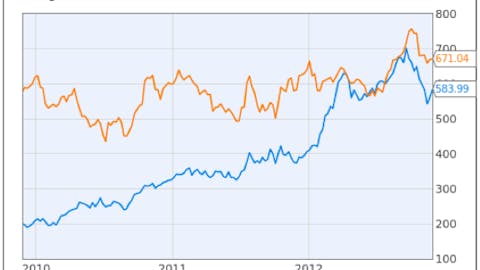In a report on Bloomberg TV yesterday, Matt Miller discussed a rather interesting issue regarding Google Inc (NASDAQ:GOOG), Apple Inc. (NASDAQ:AAPL), and other digital companies like Amazon.com, Inc. (NASDAQ:AMZN) and Facebook Inc (NASDAQ:FB). In the network’s “Global Outlook” program, Miller discussed how “France is saying that it’s going to look into changing its laws next year to try and block companies like Google and Apple from putting earnings in different European countries to avoid taxes that they would have gotten levied on in France.”
Originally appearing on a lengthier print report on Bloomberg itself, Philippe Marini, a senator who heads France’s Senate Finance Committee, paraphrastically maintains that “[t]axing the digital sector like other industries could generate more than 500 million euros ($648 million) for the French state annually, enabling it to narrow its budget deficit.”
Now, it’s obvious that France – like the rest of the Eurozone – is being fiscally squeezed, but one can make the case that these pressures are a result of its own indebtedness and willingness to participate the European Economic Area – a classic single market system – not because of malice from Google Inc (NASDAQ:GOOG) or Apple Inc. (NASDAQ:AAPL). Consider the following: according to the IMF’s latest data, General government gross debt in France comprises just over 86% of its GDP, seventh worst in Europe. In fact, France is more indebted than nations whom many would consider to be ‘peers’ more or less, like the UK (82.5%), Germany (81.5%), and even Spain (68.5%).
Even more compelling, it can be argued that “the French don’t understand the very tax system they’ve spent decades building,” as Forbes‘s Tim Worstall discusses here. Worstall says that the methods used by companies like Google and Apple Inc. (NASDAQ:AAPL) are “not loopholes: they are the point and purpose of the system […] the old national boundaries aren’t supposed to be important any more,” adding that the EU’s current tax structure gives companies “every right, indeed the system is set up to persuade you to do this, to sell from only one European base into all EU countries.”
One particularly important point that Worstall makes is about France’s 19.6% value-added tax, which, “on digital goods is paid at point of dispatch, not delivery,” meaning that the likes of AAPL, GOOG, FB, AMZN, and any other techie can set up their headquarters in a more tax-friendly country like Ireland, for example. Therefore, Apple Inc. (NASDAQ:AAPL) and the rest of the crew are well within the realm of legality to continue to use this system to their advantage; to expect corporations to not be profit-maximizers defies basic Economics 101.
What are your thoughts on this situation? Should digital VATs be levied in a similar manner as other VATs, and more importantly, should tech’s major players take the brunt of the French government’s frustrations?






